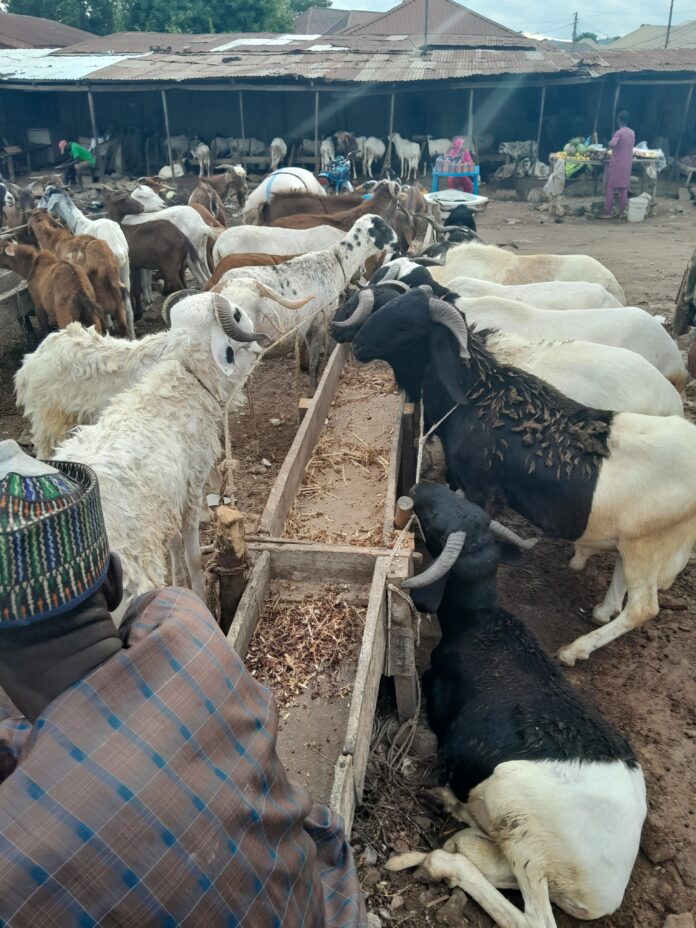Muslims in Nigeria seek alternatives as costs of rams surge ahead of Eid-el-Kabir
By Haruna YUSUF, Maryam SULAIMAN, Fa’izatu DOMA, Ibrahim YAHAYA, Cara LUCKSON (Abuja) and Kenneth AFOR (Lagos)
Muslims in Nigeria have commenced earnest preparations to mark the 2023 Eid-el-Kabir celebration. A market survey conducted by Neptune Prime in major cities like Abuja, Lagos, and some parts of Niger States revealed that low-income earning Nigerians are seeking an alternative in goats as the prices of rams, which is the most rewarding animal to be sacrificed during this festival, have skyrocketed.
This is not unexpected as the price usually goes up every year during Sallah because of high demand, but the declaration of President Bola Ahmed Tinubu to remove the petroleum subsidy has also worsened the situation.
In his inaugural address on May 29, 2023, the president stated that funds for subsidies will be diverted to other things like public infrastructure, education, healthcare, and job creation.
Although the ram is the commonest and most rewarding animal slaughtered at Sallah, other animals like goats, cows, or camels are also acceptable sacrifices, these animals are not only cheaper but also attract rewards from Allah.
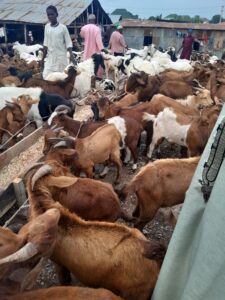
Speaking to Neptune Prime correspondent, Sheikh Nasiru Hassan, the Imam of Kaduna Road Jummat Mosque, Suleja, in Niger State, said that Muslims can go for cheaper and recommended animals like the sheep, he-goat, she-goat which are relatively cheaper than the ram.
He said Eid-el-Kabir, according to the teachings of Islam, is associated with animal sacrifice. Its origin is from the time of Prophet Abraham (Ibrahim) in Quran chapter 37 verses 102-107. Various rewards are attached to the animals used for sacrifice during this period of Layya.
A ram seller at Karu Abattoir Market in the outskirts of Abuja, Sani Bichi, told this newspaper that average Nigerians are now checking the alternative of goats. He said some buyers who come with the intention of purchasing rams settle for he-goats or the female goat as the former is more expensive than the latter.
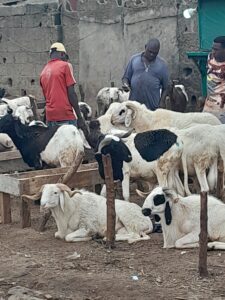
Bichi revealed that a he-goat in his pen is being sold at the price of N45,000 and the female goat goes for N35,000, which are good alternatives to rams that sell from N100,000 upward.
A buyer who identified himself as Umaru Murtala told our reporter that his family will slaughter a he-goat this Sallah. Murtala, a businessman at Nyanya market, said he has no choice but to settle for a goat instead of the preferred ram because of the economic hardship in the country.
“Is not as if I don’t want to also slaughter ram like other people but I have to live within my means this year, last year I bought ram N90,000, and this year the price of that ram that size has increased to N150,000 or N170,000.
“You would have to consider other things that are also expensive like rice, tomatoes, and the rest. I have children in the university and I’ve heard rumours that school fees will increase soon, there are so many other factors why I am going for a he-goat this year instead of a ram,” He said.
The high price of rams occasioned by transportation challenges and insecurity
Our correspondent was at the Madalla Ram Market in Suleja Local Government Area of Niger State where he learnt that a small-sized ram is being sold at the range of N150,000 to N200,000, and medium sizes are sold within the range of N250,000 to N300,000, while the big-sized rams sell from the range of N400,000 to N500,000.
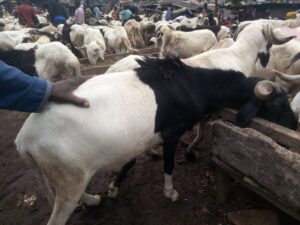
Another dealer at the market who identified himself as Adamu Umaru Waziri attributed the hike in ram prices to the prices of other commodities that have long gone up.
He lamented that the cost of transporting a truckload of animals from Jigawa State to the Madalla Ram market had also increased compared to the previous year.
He added that “In the past, we used to pay for truckload for 350,000/400,000k but now it’s about 800,000/1 million naira”.
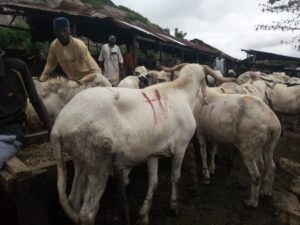
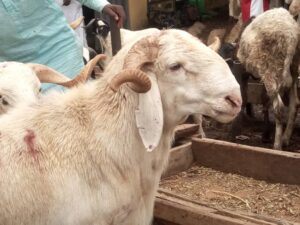
Another trader in the ram market who identified himself as Ma’azu Dogo said Madalla Ram Market is the major market that serves people from Suleja town, Abuja, and its environs but the hike in transportation and low patronage is unprecedented.
He said, “The animal feeds we used to buy at the rate of N5,000 is now N8,000 per bag and the ram that was sold for N100,000 previously is now N250,000. The one for N250,000 in the past is now N400,000 to N500,000 and worse of it all is that patronage has dropped considerably”.
When our correspondent visited the Garki Ram Market in the Federal Capital Territory, the story is still the same. A trader in the market, Malam Inuwa, said the increase in the cost of the animals is not unconnected to the increase in transportation fares which is related to the recent removal of subsidy on Petroleum Motor Spirit (PMS).
He said those that import the animals from neighbouring countries blamed the increase on the naira devaluation, which has weakened the purchasing power of the country’s currency.
Revealing the significant changes in prices as compared to last year, a ram seller in Apo Ram Market, Abuja, said, “Last year, a ram that sold at the cost of N200,000 in the village is now N300,000. You must also feed the ram apart from the high cost of transportation.
“A sack of animal feed is N8,000 even in rural areas. This was sold at half the price last year. All these costs must be factored in. We used to pay N6,000 to N8,000 to ferry a ram from places like Jigawa and Katsina to Abuja. Presently, each ram can cost you nothing less than N10,000 to be transported to Abuja,’’ he said.
According to him, the lowest price of rams range from N180,000, while the big ones sell from N500,000 to N700,000.
Neptune Prime also visited Kubwa, one of the busiest residential areas of Abuja to inquire about the Sallah preparation as regards the purchase of rams.
At the Kubwa Ram Market, Musa Ibrahim, a seller, said the challenges in this year’s Eid are more than what they experienced last year because the price of everything is on the high side which makes it difficult for people to patronise them.
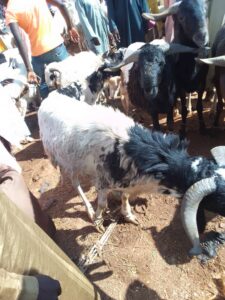
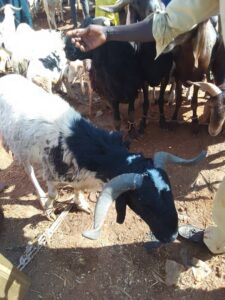
The trader blamed the turn of events on the subsidy removal and said the minimum they paid to transport a ram from Bauchi State is N5,000.
Speaking on some of the unique challenges they face in the business, Musa said, “Everything is now expensive, from what we feed the rams with to their transportation to the taxes we pay down to the commissions needed on every ram ‘kudin la’ada’. If we calculate the expenses, we end up almost doubling the price of each ram we pay.
“A ram sold at N100,000 last year is sold at N150,000 to N200,000, now and if we tell our customers that the prices have doubled, they think we are just using the opportunity to get rich but they don’t get to reflect on the expenses we incurred for the rams to be available”, he added.
Sellers remain hopeful for patronage despite economic challenges
Our correspondent visited the Alaba Rago – a section of the popular Alaba International Market along the Lagos-Badagry Expressway in Ojo Local Government Area (LGA) of Lagos State, Southwest Nigeria to find out the prices of rams in the market and the expectations of sellers regarding sales in this period of economic downturn.
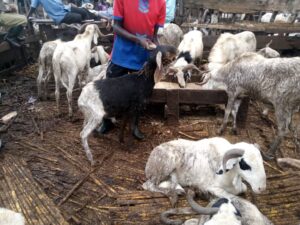
Yakubu, a ram seller, who took our correspondent around the area said rams are available based on the pocket size of buyers. He said the biggest size can sell between N200,000 and N180,000, while the medium size sells between N120,000 and N140,000 as well as N80,000 for the smallest size.
He, however, revealed that there are not many differences in the prices compared to last year.
“We will sell, we expect sales this year because there are prices for different sizes of rams here in the market. This year, the ones for N200,000 were sold for N195,000 last.
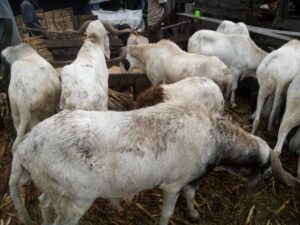
“Of course, we experienced difficulty in transporting them down to the South but the cost of transportation did not really affect the prices because most of the vehicles used – trucks are diesel engine vehicles so the hike in prices of fuel will not affect the prices of rams,” Yakubu said.
Asked which of the northern states the herds are from, he said most of the rams at the market come directly from Katsina State. He also said that they transport some of the animals from Niger Republic.
The Alaba Rago is one of the choicest locations in Lagos where agricultural commodities including beans, rice, maize, millet, soybean, and peppers among other staple food items are offloaded after a long journey of hundreds of kilometres from the northern parts of the country before they are sold to major traders who deal in the sale of such commodities at various markets in the state.
Sellers/buyers cry to the government for succour
The traders and buyers at these various markets have cried out to the government to bring measures that would quickly alleviate the sufferings of Nigerians.
After lamenting the increment in transportation fares, and the economic hardship which are among the factors causing low patronage, Bashir in Karu Abattoir Market appealed to the government to set up cooperatives that would provide easy-to-access capital for them in the market.
Bashir said lack of capital is really causing a setback for small businessmen like himself. He said a person with N800,000 can only buy 4 or fewer rams because of transportation, animal feeds, and other charges.
Similarly, Waziri from Madalla Market called on the government to come to the rescue of the poor masses amidst the ongoing economic hardship.
On his part, Musa Ibrahim in Kubwa Market said, “Government is like a mother to all, whatever they implement, we hope it is for the betterment of our lives.
“Our prayer every day is that the government makes policies that will help ease the hike in prices of goods and services because people are not finding the situation funny. We beg and pray the government listens to our cries and better our situation”.
Follow the Neptune Prime channel on WhatsApp:
Do you have breaking news, interview request, opinion, suggestion, or want your event covered? Email us at neptuneprime2233@gmail.com

